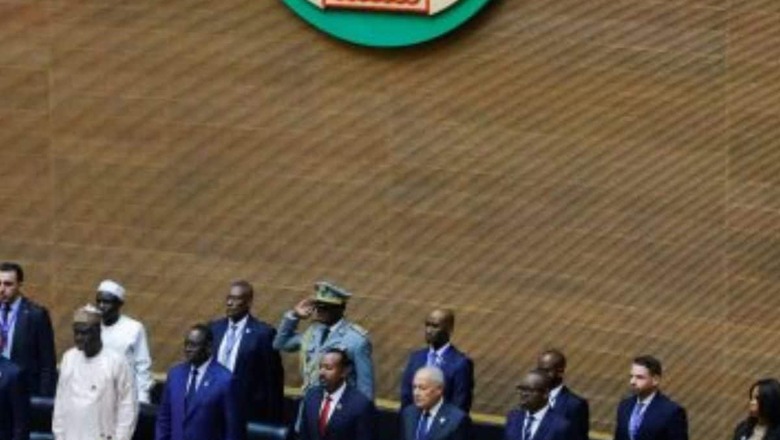
views
The new world order is splitting into three axes. The first is the United States-led Western alliance of democracies. The second is the China-Russia axis of autocratic, predatory powers. The third is the independent Global South led by India and comprising a raft of diverse nations across Asia, Africa and South America.
Europe represents the past, America the present and Africa the future. A continent of 55 sovereign nations and 1.25 billion people, Africa is the birthplace of humankind.
Homo Sapiens originated here 70,000 years ago and began a global migration to Europe, Asia and other continents. Every race today — Caucasoid, Negroid, Mongoloid and Australoid, to give them their technical anthropological nomenclature — originated in Africa.
Enslaved and colonised by Europeans for centuries, Africa is finally on the cusp of its own tryst with destiny. According to the United Nations, Nigeria in West Africa will be the world’s third most populous nation after India and China by the end of this century.
Spotting Africa’s potential early, China has been investing heavily in the continent. India is catching up. The Bharti Airtel group, for instance, operates mobile telecom services in 14 African countries. Its net profit from its African operations at $750 million (Rs 6,050 crore) has risen steadily.
A free trade agreement (FTA) with the South African Customs Union (SACU) is on the cards. The expansion of the Unified Payments Interface (UPI) to African countries as in the United Arab Emirates (UAE), Singapore and France could establish India as a global technology leader.
India has an added advantage over China. Indian migrants who came to Africa to live and work centuries ago form a bridge between Indian and Africans. The Chinese in contrast are insular: their workers on infrastructure projects have been accused of racism.
The African Union (AU) comprises all 55 African countries. Its voice is increasingly heard in global forums. South Africa will host the BRICS summit in August. Russian President Vladimir Putin will not attend the summit in person but will take part virtually. Western media had asked the South African government to arrest him against the warrant issued by the International Criminal Court.
In an interview with the BBC last month, an African National Congress leader asked the interviewer whether former British Prime Minister Tony Blair and former US President George W. Bush, who ordered the illegal bombing and invasion of Iraq that killed several thousand civilians, had been arrested?
Apart from the geopolitics of Africa’s growing importance, it is unconscionable that nearly one-sixth of humanity — roughly the same as India’s population — has a marginal voice in global affairs. India’s move to make the African Union a permanent member of the G20 is therefore both right and timely.
India’s G20 sherpa Amitabh Kant, in an interview with a business daily, noted: “Global leaders have also been expressing their support for the inclusion of AU in the G20, in various other international fora. With the Global South bearing the brunt of today’s intertwined challenges, enhancing their voice in a forum such as the G20 was a must. Africa must have a voice in addressing issues directly affecting them. By adding the AU, the G20 would come to represent 80% of the global population, up from the current 60%. This was our thinking in inviting the African Union to be part of the G20.”
Africa is a complex and diverse continent. Morocco, Tunisia, Algeria and Egypt in North Africa are Arabic. West Africa, from where Britain, France, Spain and Portugal shipped slaves to the Americas for over 300 years, is rich in oil. East Africa is home to a large Indian diaspora, including the ancestors of British Prime Minister Rishi Sunak and Home Minister Suella Braverman. South Africa was devastated by apartheid under Dutch and British colonial rule but it is, along with Nigeria, Africa’s largest economy. Central Africa though is torn by war and poverty.
Indians came to Africa both as voluntary migrants seeking work and trade and as indentured labourers shipped during British colonial rule.
The next wave of Indians is different. Apart from Indian business enterprises investing in mining, oil exploration, infrastructure and technology, educational institutes are opening campuses in Africa. The first Indian Institute of Technology (IIT) campus outside India will be established in Tanzania by IIT-Madras.
V Kamakoti, director of IIT-M is upbeat. “AT IIT-M, we are very keen on bringing women into leadership roles,” he says. “We are following sustainable development goals and one of the important goals suggested is that we need to bring in gender balance. Professor Preeti Aghalayam will be the first ever woman to be an IIT director.”
To begin operations in October 2023 in the Tanzanian city of Zanzibar, the IIT-M campus will empower women both in Africa and India. According to director Preeti Aghalayam, an IIT-M alumnus herself, “During our visits to Zanzibar as an IIT-M contingent we had noticed that the representation of women from their side was quite significant. The minister of education in Zanzibar is a woman, their permanent secretary who is a part of our steering committee is a woman, and of course, the President of Tanzania herself is a woman.”
Once the African Union joins the G20, not only will the voice of Africa be heard globally but India’s leadership of the independent axis of the Global South will play an even greater pivotal role in the new world order.
The writer is an editor, author and publisher. Views expressed in the above piece are personal and solely that of the author. They do not necessarily reflect News18’s views.















Comments
0 comment